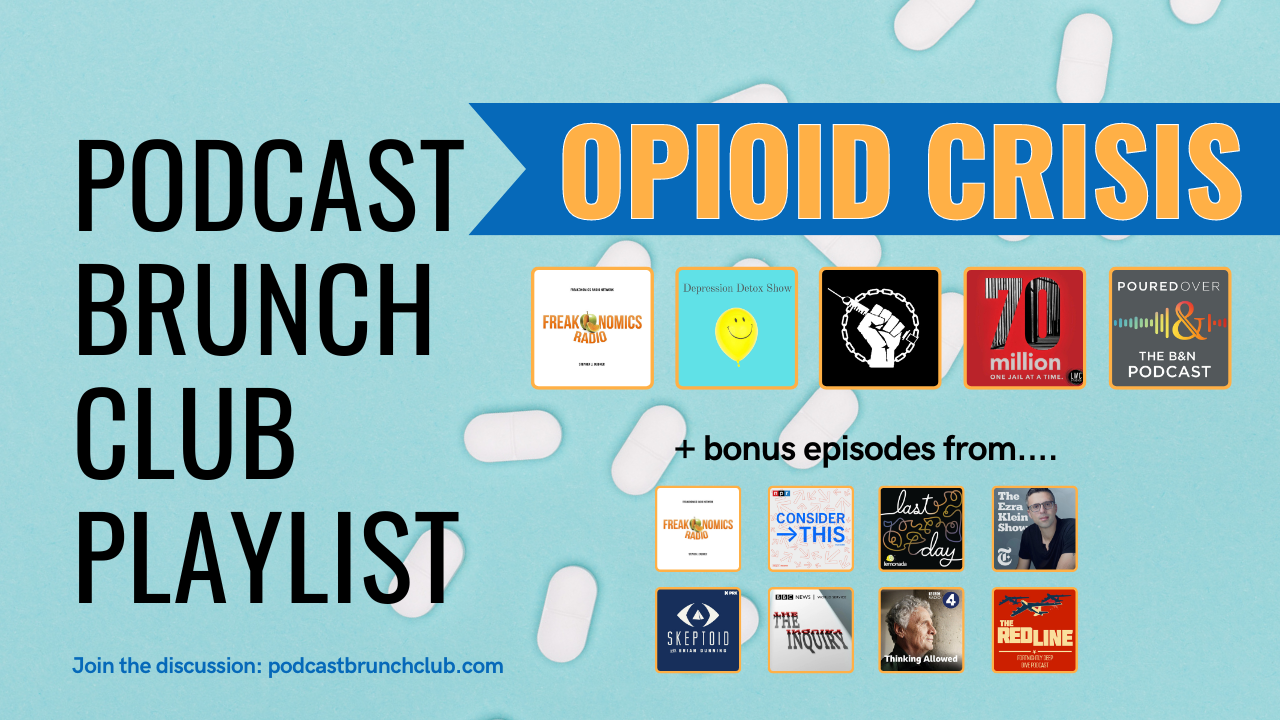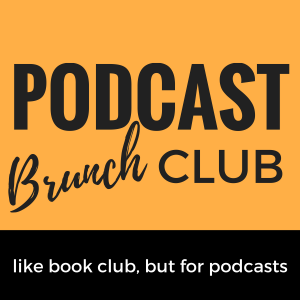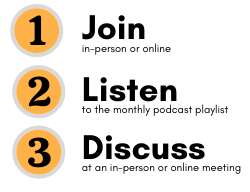OPIOID CRISIS: August 2024 podcast playlist


If you date the start of what we now call the “opioid epidemic” in 2000, more than a million Americans have died of opioid overdoses since then. One result is that many, if not most Americans know someone who has been lost to an overdose, either intentional or accidental.
This problem is peculiarly American. While Canada has a serious drug problem, it is not nearly at the scale of the crisis in the U.S. And the rest of the world is far behind, but maybe not for long.
One uniquely American response has been to look for the corporate culprits, and force them to pay for the harm they caused. There have been legal settlements with a number of corporations, and some funds are now reaching states and counties. However, one major settlement involving Purdue Pharma and the Sackler family was just blocked by the U.S. Supreme Court.
What have we achieved after almost a quarter century of this tragedy? How has the “settlement money” received so far been used? Which treatments are evidence-based, and how accessible is treatment? Are there racial disparities with regard to treatment availability?
This month, we examine these and more questions through the voices and experiences of the people most involved in the crisis, and search for hope amid the despair.
This playlist was curated by Peggy, a member of our Virtual Chapter.
Podcast Playlist on the OPIOID CRISIS
Get the full playlist on your podcast player of choice using these platforms:
| This Month’s Podcast Playlist | Running List of PBC Podcast Playlists |
| Listen Notes | Spotify | Listen Notes | Spotify |
Freakonomics Radio: “590. Can $55 Billion End the Opioid Epidemic?” (May 2024, 46 min)
Thanks to legal settlements with drug makers and distributors, states have plenty of money to boost prevention and treatment. Will it work? (Part two of a two-part series.) [Note: This episode mentions the Purdue Pharma settlement as pending. After the episode was released, the Supreme Court blocked the settlement, on the grounds that the Sackler family cannot be immunized from civil liability via a bankruptcy process.]
Depression Detox Show: “103 | Johann Hari: ‘Almost Everything We Think We Know About Addiction Is Wrong.'” (January 2021, 17 min)
Johann Hari explains that the opposite of addiction is not sobriety; the opposite of addiction is connection. He talks about what we can start doing to help heal from addiction. You can watch his talk here.
Crackdown: “Episode 38: The Knock” (June 2023, 47 min)
In Canada, being a mother who uses drugs can put you under constant scrutiny from the government. Especially if you’re Indigenous. You’re judged and watched. Hear directly from a mother who fears that knock on the door, when they come to take your kids away.
70 Million: “When a State Treats Drug Addiction Like a Health Issue, Not a Crime” (November 2021, 35 min)
Hear from people navigating the difficult paths to treatment, and experiencing the racial disparities in availability of treatment.
Poured Over: “Beth Macy on RAISING LAZARUS: HOPE, JUSTICE AND THE FUTURE OF AMERICA’S OVERDOSE CRISIS” (August 2022, 44 min)
Beth Macy’s 2018 bestseller Dopesick and the Emmy-nominated Hulu series it inspired have helped changed our national conversation about opioids and addiction. Her new book, Raising Lazarus, takes a new approach to our ever-growing crisis, focusing on solutions and the people bringing those solutions to our communities. Beth joins us on the show to talk about harm reduction, meeting people where they are, organizing at a local level, the lawsuit against Purdue Pharma and the behavior of the Sackler family, activism, and more with Poured Over’s host, Miwa Messer. [Note: This episode mentions the Purdue Pharma settlement as pending. Recently, the Supreme Court blocked that settlement, on the grounds that the Sackler family cannot be immunized from civil liability via a bankruptcy process.]
Bonus podcast episodes:
- Freakonomics Radio: “EXTRA: The Opioid Tragedy — How We Got Here” (June 2024, 46 min)
An update of our 2020 series, in which we spoke with physicians, researchers, and addicts about the root causes of the crisis — and the tension between abstinence and harm reduction. - Consider This from NPR: “Does Portugal Have The Answer To Stopping Drug Overdose Deaths?” (February 2024, 13 min)
Brian Mann covers the U-S opioid and fentanyl crisis for NPR. That means he talks to a lot of people struggling with addiction. Again and again, he’s heard stories of people who have succumbed to their addiction — last year 112, 000 — more than ever in history. But when Mann traveled to Portugal to report on that country’s model for dealing with the opioid crisis, he heard a very different story. Could the model he found in Portugal work here in the U.S.? - Last Day: “Addiction 5: Shame City” (October 2019, 43 min)
The Last Day podcast series is hosted by two women who each lost a beloved brother to a drug overdose. Together, they set out to find out what happened, why it happened, and what can be done to prevent other families from suffering the same tragic loss. The series is long, and is a difficult listen, especially if you have experienced a personal loss similar to theirs. Be aware that it could be triggering for some people. For those who can handle it, it is a riveting personal journey of grief and discovery. In this episode, Dr. Nzinga A. Harrison walks us through detox. - The Ezra Klein Show: “This Is a Very Weird Moment in the History of Drug Laws” (May 2024, 1 hr 2 min)
Drug policy feels very unsettled right now. The war on drugs was a failure. But so far, the war on the war on drugs hasn’t entirely been a success, either. As usual, Ezra Klein provides a thoughtful examination of where we are and where we could go with this issue. - Skeptoid: “Skeptoid #812: 20 Years of Data from Portugal: Drug Decriminalization” (December 2021, 14 min)
20 years ago, Portugal decriminalized all drugs in an effort to reduce addiction, incarceration, and negative health impacts. How has it worked? This podcast is for those who like to geek out on statistics and data. - The Inquiry: “Are synthetic opioids a global problem?” (April 2024, 24 min)
This podcast provides some answers to the question of whether the U.S. and Canada are outliers with regard to opioid use issues. - Thinking Allowed: “Opioids” (June 2024, 30 min)
An examination of the changing nature of opioid use in the U.S. and the U.K. - The Red Line: “92 – Narco-Economics: Inside the Mexican Drug Trade” (April 2023, 1 hr 45 min)
The TLDR: The drug epidemic cannot be solved on the supply side as long as demand is strong.
This is a long and complex examination of the economics of the drug trade, from plant-based drugs to synthetic opioids. The episode looks at the complex and lucrative world of the Mexican cartel drug trade and explores the economic factors that drive it. From the production and transportation of drugs to the money laundering schemes used to hide profits, we examine the various stages of the drug trade and the key players involved. We also discuss the impact of the drug trade on the Mexican economy and society, as well as the efforts being made to combat this illicit industry. Is there a way to blunt the rise of drugs like Fentanyl, or are we continuing down a path that simply empowers the cartels? We ask our panel of experts.
Conversation Starter Questions:
- Is addiction really a disease or is it a moral failing?
- Is some level of shame or coercion required to convince addicts to get treatment?
- Would safe injection sites promote more drug use or save lives?
- Should the Sackler family members (as individuals) be held responsible for initiating the opioid crisis?
- How should settlement monies be spent and accounted for?
Additional Resources
- Book: Dreamland: The True Tale of America’s Opiate Epidemic by Sam Quinones
- Book: The Least of Us: True Tales of America and Hope in the Time of Fentanyl and Meth by Sam Quinones
- Book: Dopesick: Dealers, Doctors, and the Drug Company That Addicted America by Beth Macy
- Book: Empire of Pain: The Secret History of the Sackler Dynasty by Patrick Radden Keefe
- Book: Raising Lazarus: Hope, Justice, and the Future of America’s Overdose Crisis by Beth Macy
- Book: Chasing the Scream by Johann Hari
- Book: Undoing Drugs: The Untold Story of Harm Reduction and the Future of Addiction by Maia Szalavitz
- Book: Death in Mud Lick: A Coal Country Fight Against the Drug Companies That Delivered the Opioid Epidemic by Eric Eyre
- Hulu streaming TV series: Dopesick. Based on Beth Macy’s book.
- Audible Original series: Finding Tess by Beth Macy




Don’t overlook The 13th Step, the Pulitzer-finalist podcast from New Hampshire Public Radio. Here’s a description of the show:
It started with a tip. Eventually, multiple sources said it was an open secret: The founder of New Hampshire’s largest addiction treatment network was sexually harassing or assaulting women – allegations he denies.
How did he get away with it? That question led investigative reporter Lauren Chooljian on a journey into the American addiction treatment industry. She found a longstanding – and long tolerated – culture of sexual misconduct. A phenomenon people in the recovery world call “the 13th step.”
This series is about failures in an industry that is supposed to be dedicated to healing. It’s also about the limits of the #MeToo movement. And journalism. How deep can you dig for the truth before it gets dangerous?